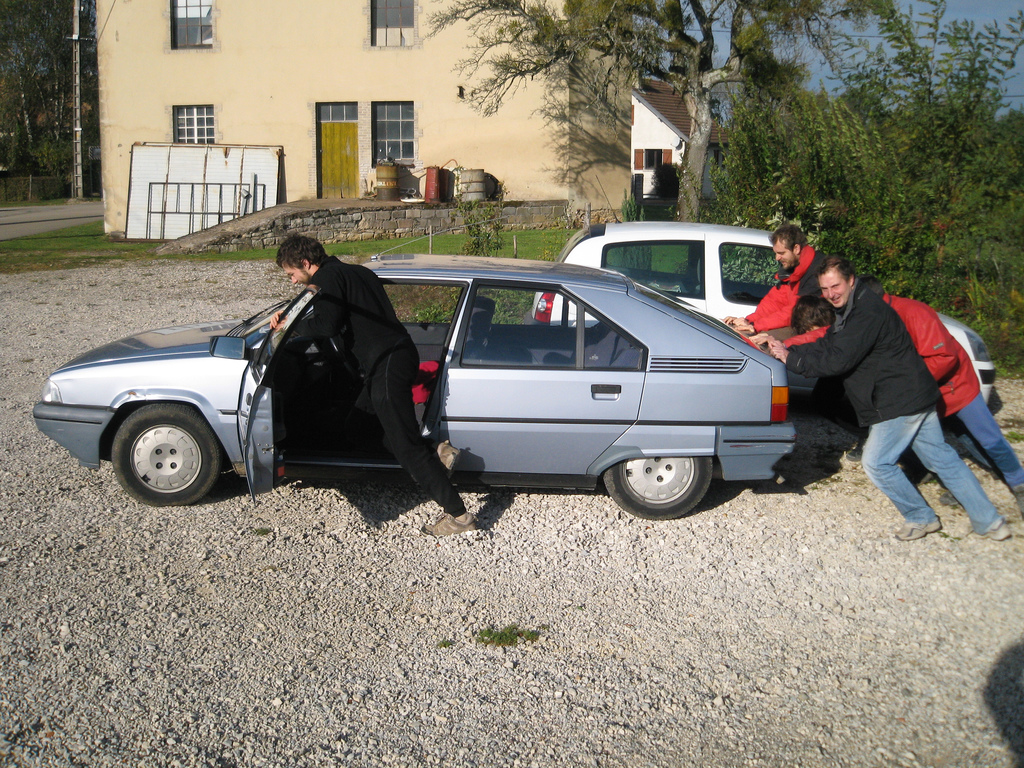I would have slammed into her if I hadn’t been looking. Luckily, at that particular moment anyway, I was, and so stopped within a few feet of her flashing hazards. The silver 1990s Corolla was bunching up the morning commute, and clearly the car was going nowhere.
On another morning, a more hectic morning, no doubt, I would have quietly moved over and sped past. But this morning I had time and could see the danger this vehicle was to others not to mention the driver within.
“Drop it into neutral, I’ll give you a push,” I said to the relieved middle-aged woman at the wheel. A few steps to the rear and I was testing the tread on my dress shoes, pushing for all I was worth. Fortunately two other guys took pity and joined the effort. “Mornin’,” one of them said with a grunt.

photo credit: Esprit de sel via photopin cc
We pushed the car into a fire station’s parking lot, and the driver assured us help was on its way, we didn’t need to stay. She was so grateful she almost gave us—complete strangers—a hug.
Are You Stuck?
Sometimes we get stuck. That’s just the way it goes, especially in the creative life. Whether you’re a writer, artist, entrepreneur, or manager, you’ve been there. You get to the end of yourself and wonder, sometimes desperately, what to do next.
Maybe you feel that way right now. Maybe you’re a writer and you don’t know which next step is the best one to take. Maybe you’re an entrepreneur or platform builder, and overwhelm has you firmly in its sights. Maybe you’re a manager and you’re trying to figure out how on earth to guide your team into a successful future.
What if you were in a group of people to whom you could shoot a quick message this very moment? “Hey,” you might say, “I could really use some help…” And what if that group of people responded with supportive suggestions? What if shortly thereafter you all joined a videoconference call, and they listened to your story and gave you some really helpful advice?
Success vs. Not So Much
Or imagine you had a personal board of directors. Now imagine that the same group of people was a personal board of directors for everyone involved. That’s one way to think about what I and others call a mastermind group.
Here’s the difference between people who succeed in a holistic, healthy way and those who don’t: successful, healthy people are connected with others. They interact regularly with a team of people who care and want to nurture each other’s vitality and productivity.
You can do your art in a lot of different ways. My advice: don’t go it alone. [Tweet that!]
You Have a Choice
I’ve been in a mastermind group for about a year now, and it’s been a great place for me to interact with other writers and entrepreneurs. I’ve learned a ton, I’ve benefited financially from the network of my fellow masterminds, and more importantly I’ve made some new friends.
Our mastermind group was started by professional blogger Jonathan Milligan. I can tell you from personal experience that Jon is someone who cares deeply about the success of others. I admire Jon. You couldn’t ask for a better teacher.
How is this relevant to you? Jonathan and I are hosting a webinar on how to start a mastermind group. It takes place tonight (Tuesday, September 30, 2014) at 9pm Eastern. You’ll hear about how Jonathan started our mastermind group, and you’ll learn how to start your own. You’ll learn how to structure your group to set it up for a healthy, long life of creative interaction and mutual support.
I hope you can make it. Everyone who registers will receive a recording of the webinar. To learn more, CLICK HERE.
Question: If you were in a supportive group that cared about you and your health and success, what question would you ask them right now? You can leave a comment by clicking here.

At times I have any number of ideas that I want to pursue. How do I maintain focus to finish one project before starting another?
Yes! A mastermind group could be hugely helpful with this. For example, you could ask the group to hold you to finishing project A before you move on project B. Great use of a MM.
How does a Mastermind group differ from a writers’ circle or critique group?
I look forward to this webinar. I’ve tried a number of different writing groups — online and in person; some for just a short while and others for years. My hurdles come in finding the right fit and fostering sustainability. We might have a small group that really clicks, but then life takes over and few of us have the energy/time/resources to keep the group afloat.
Tanya, that’s a great question. I’m part of a creative circle that gets together once a month in person. There we talk about what’s inspiring us, what we’re working on, and so on. My mastermind group meets weekly via Google Hangout and each of us takes turn being in the “hotseat”–when one of us shares a challenge we’re having and the rest of us chime in with suggestions. My particular mastermind grew out of Platform University, so it tends to focus on platform and business building–everything from how to grow your email list to what pricing to use to how to use LinkedIn as part of a social media strategy.
I hear you when it comes to groups coming and going. I do think most groups have a natural life cycle, but Jonathan has some great ideas about how to make a group sustainable. Glad you’re coming to the webinar. I think it’ll be informative for you.